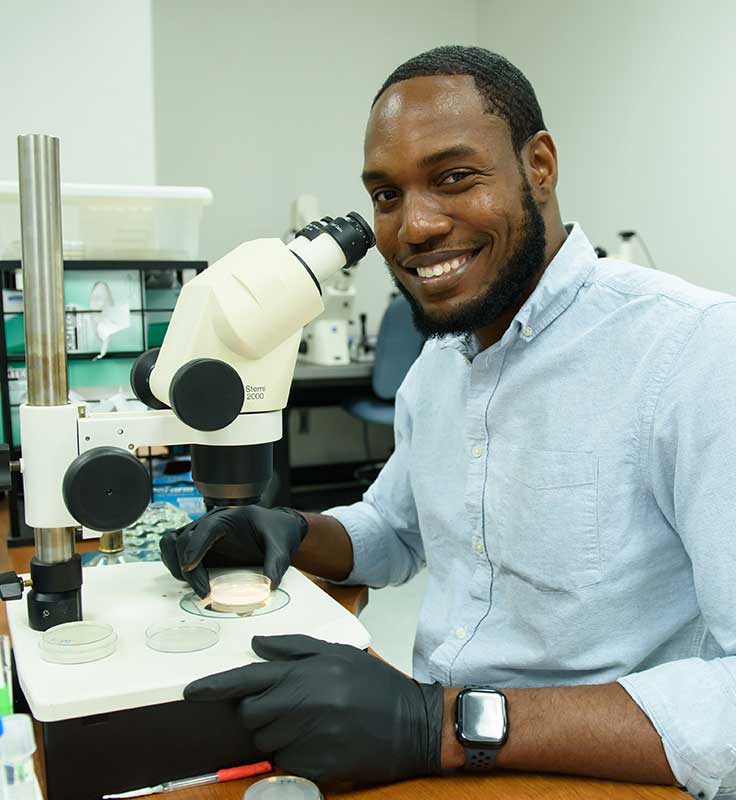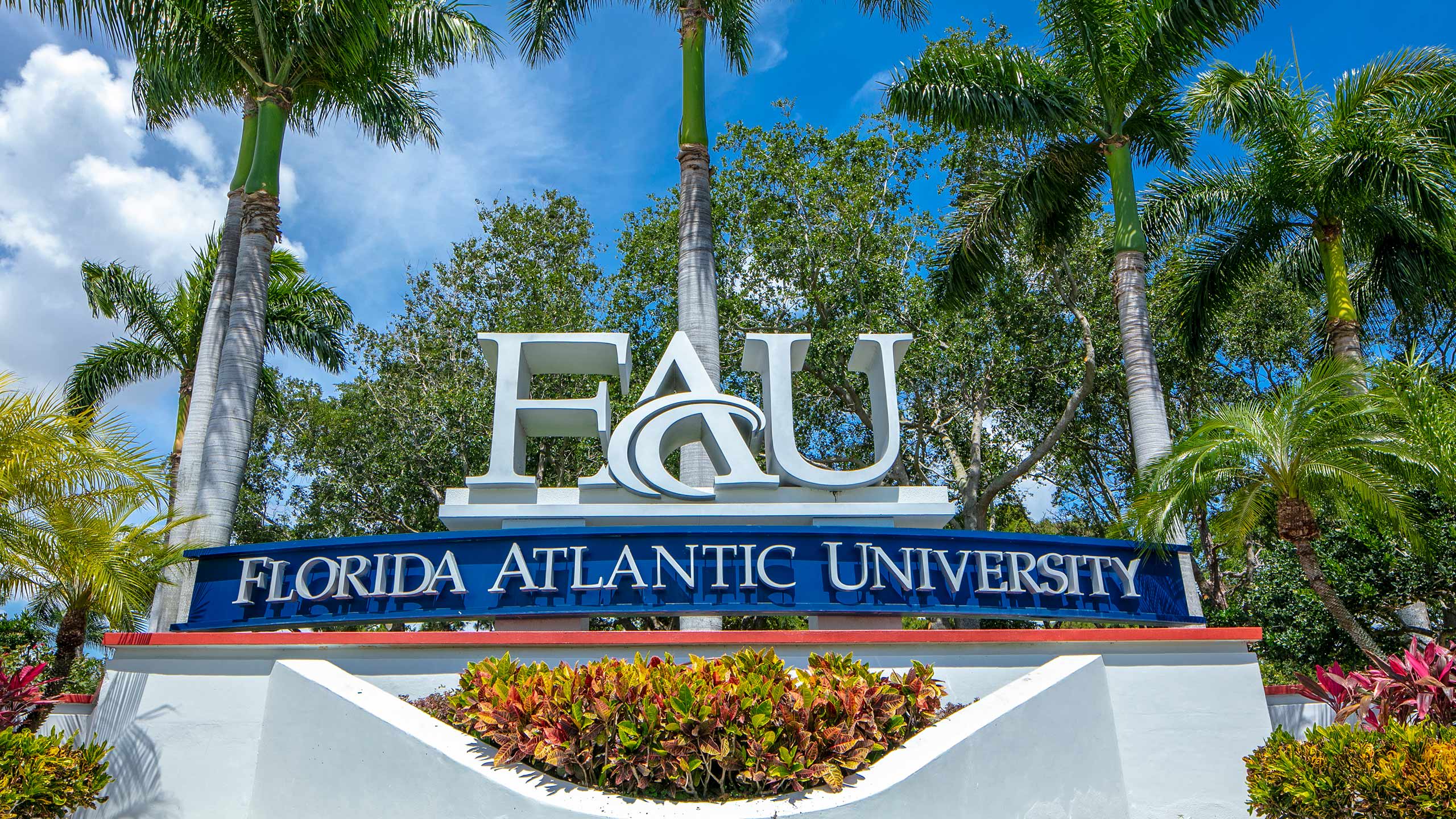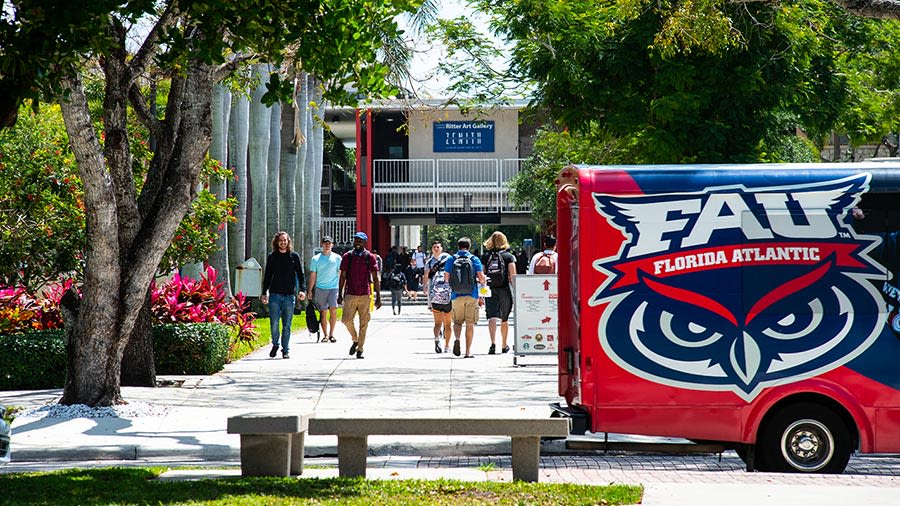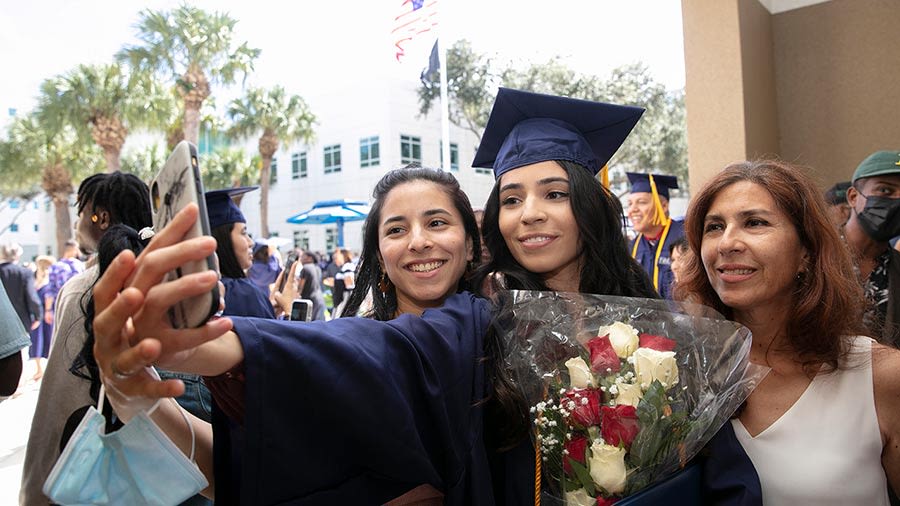Florida Atlantic University is creating generational change through equitable student success
The public research university of 30,000 students has emerged as a national leader in academic achievement and social mobility.

Before Florida Atlantic University was established in Boca Raton, there was a U.S. Army air base where young men were trained to operate radar systems during World War II.
The military planes, the radar school and the air base are long gone, but the university built on this site has taken flight.
Over the past decade, Florida Atlantic has soared into the ranks of national leaders in student achievement and social mobility. Its innovative student-centered Success for All strategy has more than doubled graduation rates and erased gaps in completion rates based on race, ethnicity and income. By improving retention rates and reducing dropouts, Florida Atlantic is preparing its graduates for academic and career success that will propel them and their families forward for generations.
“The university has a responsibility to put in place a framework to support student success, regardless of the students’ backgrounds,” said James Capp, Florida Atlantic’s assistant provost for academic operations and planning. “And we have delivered on the promise of moving students up income brackets.”

Before Florida Atlantic University was established in Boca Raton, there was a U.S. Army air base where young men were trained to operate radar systems during World War II.
The military planes, the radar school and the air base are long gone, but the university built on this site has taken flight.
Over the past decade, Florida Atlantic has soared into the ranks of national leaders in student achievement and social mobility. Its innovative student-centered Success for All strategy has more than doubled graduation rates and erased gaps in completion rates based on race, ethnicity and income. By improving retention rates and reducing dropouts, Florida Atlantic is preparing its graduates for academic and career success that will propel them and their families forward for generations.
“The university has a responsibility to put in place a framework to support student success, regardless of the students’ backgrounds,” said James Capp, Florida Atlantic’s assistant provost for academic operations and planning. “And we have delivered on the promise of moving students up income brackets.”

Improving the numbers
Founded in 1961, Florida Atlantic has grown into a public research university of 30,000 students on six campuses. It is also Florida’s most diverse public university. Among its undergraduate population, nearly 60% identify as students of color, with Hispanic (29%) and Black (19%) as its largest underrepresented groups. Thirty percent are first-generation college students; 40% receive Pell Grants.
Traditionally, Florida Atlantic was viewed as a commuter school where most students attended part time and few graduated in four years. When President Emeritus John Kelly saw during his interview that the four-year graduation rate was 19%, he asked if it was a typo.
Kelly, who served as Florida Atlantic’s president from 2014 to 2022, led a remarkable transformation:
- Its four-year graduation rate for first-time full-time undergraduates reached 50% in 2021. Not only is it the largest improvement in Florida over that time, it’s 10 percentage points above national averages.
- Florida Atlantic eliminated equity gaps in graduation rates. In 2021, Pell-eligible students (51.4% graduation rate) and students of color (50.4%) graduated at or above the university average.
- First- to second-year retention rates improved from 66% to 81%. This was the second-biggest improvement in the state university system over six years.
- Florida Atlantic significantly increased social and economic mobility of its low-income students. Of students who entered the university at the lowest income tier, according to an internal study published in 2022, 83% of them secured jobs immediately upon graduation that propelled them into a higher income bracket.
Florida Atlantic’s success has received national recognition. The university ranks 41st in U.S. News & World Report’s social mobility rankings and is in the 95th percentile of the inaugural social mobility rankings published by the think tank Third Way. And in November, Florida Atlantic received the Association of Public and Land-grant Universities’ prestigious Degree Completion Award.
So how did Florida Atlantic pull it off?

Raising expectations
The university set in motion an ambitious plan to deliver on its promise to give its students an excellent education that could lead to a better life.
Leaders realized that there were no clear expectations for timely academic progress and graduation and that institutional silos and a lack of a strategy focused on student success made it difficult for students to find the support they needed. Florida Atlantic made significant changes to strategy, policy and curriculum to ensure that all students would succeed.
The university deployed team-based real-time analytics to quickly identify students who needed support and ensure resources got to them. Cross-functional teams worked across university units to develop a unified accountability framework and create trust and strong working relationships.
“Our teams give us an opportunity to cut across institutional silos and focus on a singular vision of supporting our students,” said Capp, who chairs the university’s Student Success Analytics Workgroup. “Team members come together to launch policy changes, curricular revisions and steer financial resources to the students who can benefit the most.”

Each Florida Atlantic student gets a Flight Plan — a nod to the university’s mascot, the burrowing owl — which is a semester-by-semester map of classes for each major that shows academic milestones they are expected to reach to graduate on time. All students are also assigned to a personalized Success Network — a team composed of an academic advisor, career coach and financial aid counselor — for their entire university tenure.
Florida Atlantic also reduced upper-division bottlenecks that led students to stop out or transfer. A new Bachelor of General Studies program offered a flexible pathway to a degree for students unable to complete their original major. A new interdisciplinary Bachelor of Health Sciences was geared to students unable to enter a limited-enrollment program such as nursing. University leaders credit these two new programs over the past five years with helping nearly 3,000 students who might not have graduated complete a Florida Atlantic degree.
“Students are able to get the feel of a university that’s twice our size, with athletics and all that, while also having a small university experience with the hands-on, one-on-one support they need,” said Keven Allen Jr., director of first-generation student success. “That’s the magic of Florida Atlantic.”
Investing in students
Early on in the process to reimagine Florida Atlantic’s student success efforts, multiple consultants told the university there was one easy way to increase the graduation rate: convert all need-based aid to merit-based aid.
The university was unwilling to sacrifice its focus on social mobility, so instead it committed more funds than ever to rewarding students for their academic progress. Not only could this approach increase retention and graduation, it also would meet the university’s mission of supporting success for all students and having impact across generations.

The signature scholarship launched in 2017 is the Kelly/Strul Emerging Scholars Program. Named for the president emeritus and his wife and the private philanthropists who initially endowed it, this four-year scholarship provides promising low-income first-generation students with a debt-free education, academic support and a full suite of wraparound services. The program currently supports 66 scholars, with an eventual goal of having 320 on campus at one time. So far, all admitted Kelly/Strul scholars have graduated in four years or less.
Florida Atlantic also offers many students annual grants for completing a minimum of 30 credits each year, which keeps students on track to graduate in four years. A progressive grant program increases the scholarship award each year a student returns to campus. Another scholarship program encourages students to start graduate programs as they wrap up their undergraduate degrees.
Its Launch Scholarship, which incentivizes students to enroll in an extra course to help them graduate on time, has provided especially strong returns. A recent university study found that it increased retention and graduation rates by about 2% annually. Plus, the program has brought in more than twice as much tuition revenue as the university has paid out in grants.
“It’s truly the aid that’s providing that level of access to our university,” Allen said. “And when you combine that with the staff that’s working to help these students be successful, that is a differentiator here at Florida Atlantic.”
This custom content is sponsored by Florida Atlantic University and developed by Inside Higher Ed's sponsored content team. The editorial staff of Inside Higher Ed had no role in its creation.


